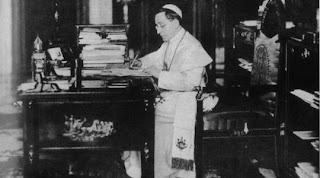Wiliness, evasiveness, confusion, lukewarmness: the work of Nichols, Archbishop of Laodicea.
(See previous post: The crisis of the Church is a crisis of Bishops: The "Season of Pride"?)
Pastoral provision at the Church of Our Lady of the Assumption
The Most Rev Vincent Nichols, Archbishop of Westminster, has reaffirmed the intention and purpose of the pastoral provision for Catholics of a same-sex orientation at the Church of Our Lady of the Assumption, Warwick Street, London W1.
In a statement issued on 28 February 2012 he said:
“As we approach the fifth anniversary of the establishment of a pastoral provision for Catholics of a same-sex orientation * at the Church of Our Lady of the Assumption, I would like reaffirm the intention and purpose of this outreach.”
“That intention and purpose were clearly set out in the statement issued by the Diocese of Westminster in 2007 when the provision was started under the guidance of Cardinal Cormac Murphy O’Connor. This statement is set out below.” (Section A)
“Furthermore it is important to recall and study again the direction and guidance set out by Cardinal Hume in 1997. This document, too, is set out below.“ (Section B)
“In order to appreciate the intention and purpose of this provision a close reading of these two documents is required.”
“These documents outline three essential foundations: the dignity of all persons created by God, the moral principles concerning chastity and the Church's teaching on sexual activity, and the pastoral care of Catholics who are of same-sex orientation. All who participate in the Mass are called to live the church's teaching through an ongoing conversion of life.”
“At the present time consideration is being given to the circumstances in which these Masses are celebrated to ensure that their purpose is respected and that they are not occasions for confusion or opposition concerning the positive teaching of the Church on the meaning of human sexuality or the moral imperatives that flow from that teaching, which we uphold and towards which we all strive.”
*Note: The language used by the Catechism of the Catholic Church and other Church documents is the term ‘homosexual’. I am also conscious that the abbreviation LGBT is preferred by many as a collective identification. Whatever language is used, it is worth bearing in mind that the Church “refuses to consider the person as a ‘heterosexual’ or a ‘homosexual’ and insists that every person has a fundamental identity: the creature of God and, by grace, his child and heir to eternal life” (Congregation for the Doctrine of the Faith, On the Pastoral Care of Homosexual Persons, par 16). [Source. Tip: Catholic Herald]
No, the whole text is a sad exercise in deception: the "Soho Masses" are about the promotion, "advocacy", and celebration of "lifestyles". Allowing them is disastrous - equivocation and tergiversation about their content, when it is there for all to see, is unworthy of any honest human being, cleric or layman, and gravely disrespectful of the Holy See. Clerics in the Westminster diocesan chancery, allow and promote evil and perverted things at your own spiritual peril - but, please, do not treat your fellow Catholics as gullible simpletons.
The video above, which is just one single tiny example of what goes on in those celebrations, is quite open and direct about "pride" and the "season of pride" and the need for "diversity". The same document selectively and deceitfully quoted by +Laodicea is quite clear about what programs can be put forward by Bishops:
The video above, which is just one single tiny example of what goes on in those celebrations, is quite open and direct about "pride" and the "season of pride" and the need for "diversity". The same document selectively and deceitfully quoted by +Laodicea is quite clear about what programs can be put forward by Bishops:
We encourage the Bishops, then, to provide pastoral care in full accord with the teaching of the Church for homosexual persons of their dioceses. No authentic pastoral programme will include organizations in which homosexual persons associate with each other without clearly stating that homosexual activity is immoral. A truly pastoral approach will appreciate the need for homosexual persons to avoid the near occasions of sin.
We would heartily encourage programmes where these dangers are avoided. But we wish to make it clear that departure from the Church's teaching, or silence about it, in an effort to provide pastoral care is neither caring nor pastoral. Only what is true can ultimately be pastoral. The neglect of the Church's position prevents homosexual men and women from receiving the care they need and deserve.
An authentic pastoral programme will assist homosexual persons at all levels of the spiritual life: through the sacraments, and in particular through the frequent and sincere use of the sacrament of Reconciliation, through prayer, witness, counsel and individual care. In such a way, the entire Christian community can come to recognize its own call to assist its brothers and sisters, without deluding them or isolating them.
Enough is enough. Adesso basta con questa vergogna!


,_j%C3%A9suite.jpg)



















